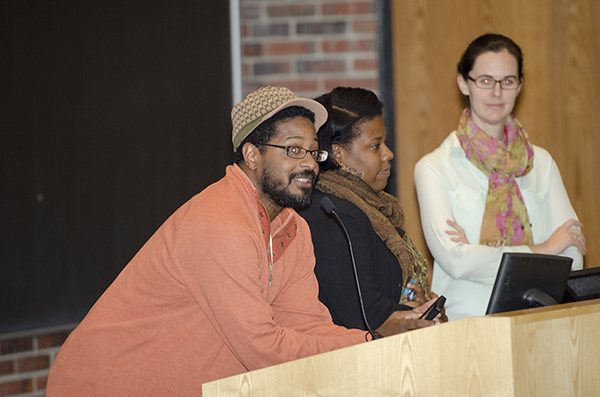

Black Studies professor Karanja Carroll and sociology Professor Alexandra Cox organized a public screening of the PBS documentary, “The Murder of Emmett Till” in response to the sign “Emmett Till deserved to die” posted in Dubois Hall last week.
The documentary, which screened on Wednesday, Oct. 30 in Lecture Center 100, uncovers the life of Emmett Till, his murder, the circumstances surrounding his murder, the aftermath of his death and its effects.
According to Carroll, the idea to show the film stemmed in part from a statement SUNY New Paltz President Donald Christian made in his email to the campus regarding the sign.
Christian wrote that in talking with students about the incident, many did not know who Emmett Till was.
Carroll said that by showing the film, audiences would hopefully be educated as to who Emmett Till was, his role in the Civil Rights Movement and the larger Black Freedom Movement as well as why the posting in Dubois is of significance to students.
“I think that a lot of my students still don’t completely get why this matters or why students are upset about the sign,” Cox said. “[Screening this film] will put into context why the sign felt so scary for a lot of students.”
Cox said the most poignant reactions to the sign have come from students who expressed fear and anger over the incident only to receive a response from some faculty and administrators that the incident is “not a big deal.”
“I think that’s been what is most frustrating to me, that in the face of what they experience as outrage they’re getting indifference,” Cox said. “A number of students feel like there has been a sense [from administration and faculty] that they are ruffling too many feathers by bringing attention to the issue, that raising the issue only causes more problems.”
Carroll said while discussing the incident in class, a number of students of color expressed concern over their safety on campus given the racist remarks that have appeared in New Paltz in the past few years.
“This happened in a dormitory [residence hall]. It’s supposed to be your home away from home and represent some level of security and comfort,” Carroll said. “Yet you walk out of your suite and this sign is what you see across the hall? There is clearly an issue of safety that has come upon the students.”
Cox said that some students have even expressed doubt over staying in New Paltz.
“When those individuals feel like they don’t want to be part of this community anymore, when they don’t feel safe inhabiting those roles [as campus leaders], then New Paltz isn’t New Paltz. I think that’s part of the problem when not proactively addressing this issue.”
Carroll said that student organizations should lead the discussion on the racial signage issue because it effects them the most, but said that Cox and himself planned to organize a faculty response in the coming weeks.
“Hopefully within the next week or two, I can pull some faculty together and we can start having some discussions about how to have these things not happen on campus and infuse this particular type of thinking in our teaching,” Carroll said.
